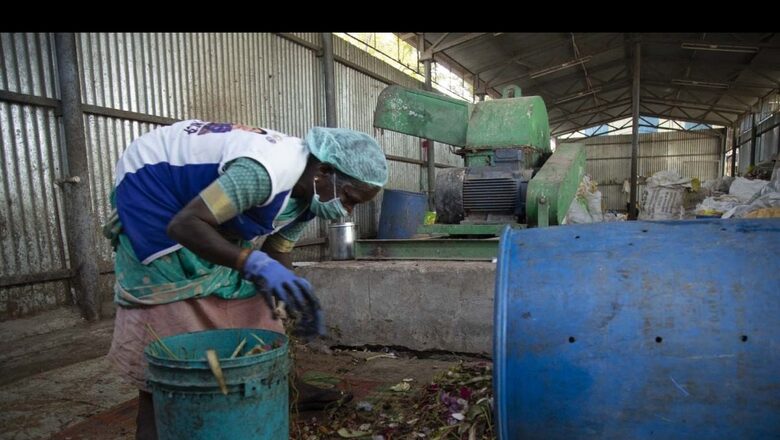
views
“Cleanliness is next to godliness.” – John Wesley
India is home to the world’s largest sanitation drive – the Swachh Bharat Mission. Today, every Indian has access to a toilet, and education about toilet use and good sanitation practices are part of school curriculum. However, the tangible change we’ve seen in the form of cleaner cities, and cleaner toilets is thanks, in no small part, to an army of unsung heroes: women sanitation workers.
These women are not only providing essential services to the society, but also contributing to the broader vision of a cleaner and healthier India.
Women sanitation workers: The core job
Women sanitation workers are playing a vital role in improving the sanitation situation in India. They clean our public and community toilets, collect and segregate wastes from households and commercial establishments and dispose of them safely, preventing the spread of diseases. They are also a part of the municipal corporation, cleaning sewers and septic tanks, streets, public parks and other spaces. By simply doing their jobs, they not only keep our living spaces aesthetically clean, but also prevent vector borne diseases, respiratory illnesses, infectious diseases that spread from pathogens in human wastes, and of course, diarrhoeal disease.
Women sanitation workers: The enhanced role
Women sanitation workers are also the frontline in bringing about the change in behaviour that is so important for the Swachh Bharat Mission to succeed. These are the people who clean our toilets, and therefore, are the first to know when one of the users doesn’t understand the basics. Even in our communal toilets in the city, we’ve all come across toilets that have become unusable because someone didn’t flush, or flushed something that wasn’t meant to be, or otherwise made a mess.
When toilet attendants are present, they are able to handle the situation as it happens. Toilet attendants often undergo soft skills training and are able to communicate the tenets of good toilet hygiene with respect and empathy, turning a potentially embarrassing episode into a learning opportunity.
The same goes for women’s menstrual hygiene. These are new habits amongst a wide swath of women in our country, who often don’t know who to raise their questions with. Trained sanitation workers are able to close these gaps by doing remedial communication, helping users adopt new habits. Women sanitation workers play a crucial role here. These topics are still considered too taboo for polite conversation and so they can be much more receptive when it’s a woman sanitation worker offering them information.
Moreover, as these sanitation workers often hail from the same communities they serve, they have an intrinsic understanding of the taboos and hesitations and knowledge gaps these women have to overcome. They are able to communicate in ways that get the message across, while keeping the communication well within the bounds of propriety.
It may seem like a small thing, but by communicating in this manner, these sanitation workers are able to talk to children and grandmothers alike – opening up space for questions that they otherwise wouldn’t be able to ask anyone else. In this way, we can draw a direct line between the improved health of these communities, and the work these sanitation workers do.
Women Sanitation Workers: Being The Change They Want To See
Despite their valuable contribution, women sanitation workers face many challenges in their work. In fact, most face a trifecta of discrimination – for being a sanitation worker, for being from backward or lower classes, and for being a woman. Because of this ‘othering’ these women often face deeply dehumanising conditions at a job that is inherently hazardous because they deal with wastes.
Moreover, as these women are often poor, uneducated and with limited options, they are ripe for exploitation in the unorganised sector. These women are paid poorly, and often, pay is withheld for the minutest mistakes. They are also targets of other forms of exploitation.
Long lasting change comes from within, and women sanitation workers are no different. With the help of NGOs and grassroots organisations, women sanitation workers are dispelling these attitudes, myths and mindsets about sanitation work and sanitation workers. Education is playing a transformative role here.
Harpic, as India’s leading brand in the lavatory care segment has a deep and nuanced understanding of the challenges women sanitation workers face, and particularly so, of those who hail from lower castes. With an aim to lift these women from the morass of poverty, exploitation and stigma, Harpic founded the Harpic World Toilet College (HWTC) in 2016.
HWTC was established with the stated objective of improving the quality of life of sanitation workers through their rehabilitation by linking them with dignified livelihood options. Workers trained by the college are provided placement with various organisations. Following the successful proof of concept in Rishikesh, HWTCs have opened in Maharashtra, Aurangabad, in partnership with Harpic, Jagran Pehel and Maharashtra Government.
In India, organisations like HWTC have been at the forefront of transforming the lives of sanitation workers. Through training, support, and empowerment, these initiatives are driving change and helping these workers break free from the shackles of poverty and discrimination. Programs like HWTC provide them with valuable skills and knowledge, enabling them to rise above their circumstances and reshape their lives.
Of course, Harpic is going beyond the work it does at HWTC to help create awareness amongst a larger group of people – us. Harpic joined hands with News18 in Mission Swachhta aur Paani, a movement that champions the cause of inclusive sanitation, equality for all genders, abilities, castes and classes and the strong belief that clean toilets are a shared responsibility.
Mission Swachhta aur Paani leverages News18’s vast reach to bring these problems and their solutions to people like us, who then have the power to campaign for these solutions with our municipalities, our elected officials, and even bring about changes at our own workplaces.
India is going through a great transformation, isn’t it important for us too, to be the change we want to see? Join us here, to be a part of the solution that moves us towards a more Swasth and Swachh Bharat.

















Comments
0 comment